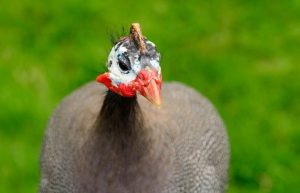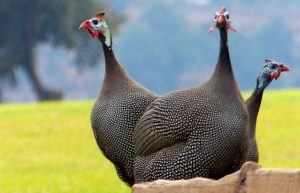
10 Ways to Protect Guinea Fowl From Predators
Guinea Fowl can be useful poultry when it comes to natural pest control, alert birds, meat production, or egg-laying. However, they are also known for their knack of getting themselves in trouble and usually meeting an early demise at the hand of a predator. If you plan on getting Guinea Fowl, you should have an idea on how you plan to provide them with protection against predators.
So, how do you protect Guinea Fowl from predators? Here is a list of ten simple ways you can provide your Guinea Fowl with protection against predators:
- Teach your Guinea Fowl to return to a coop at night
- Provide adequate shelter to free-ranging Guinea Fowl
- Only free-range your Guinea Fowl when you’re there to supervise
- Keep your Guinea Fowl in an enclosure
- Plant tall trees on your where your Guinea Fowl can roost
- Put up a tall fence to keep predators off your property
- Clip your Guinea Fowl’s wings so they can’t fly over security fences
- Keep your Guinea Fowl with geese or dogs
- Clear away underbrush or debris where predators could hide
- Invest in a group of Guinea Fowl rather than a single bird
While Guinea Fowl often have their lives cut short due to predators, when properly protected and cared for, Guinea Fowl can live up to 15 years. In this article, I’ll go into more detail on how you can protect your Guineas!
Teach Your Guinea Fowl to Return to a Coop Each Night
When you have chickens, it’s easy to put them up in a coop each night, as out of habit they return to a place of security and safety to nest. When you have Guinea Fowl, this is not the case. Guineas are still considered undomesticated birds, and they prefer to be in large open spaces where they can roam. They’ll also avoid narrow dark areas, like a coop, where a predator could be waiting to trap them.
The good news is, you can train Guinea Fowl to return to a coop each night! Guineas are particularly susceptible to predators at night due to bad eyesight, so putting them in a coop can greatly increase their chances of survival. There are a fews ways you can teach your Guinea Fowl to return to a coop.
One easy way to get Guinea Fowl to go into a coop each night is to keep them with chickens. Guineas naturally like to be in a group where they feel more protected. If they see chickens going in a coop, they’ll likely go into the coop. Another way to teach them to accept the coop is by training them to do so from the time they are keets, or baby Guinea Fowl. This way, going into the coop will seem more natural to them.
to know more, check out my article Do Guinea Fowl Need a Coop? Essential Care Guide.
Provide Adequate Shelter to Free-Ranging Guinea Fowl
Free-ranging poultry is when the birds aren’t kept in an enclosure, but rather allowed to wonder as they please. If you want to provide your Guinea Fowl with the most natural living experience and allow them to free-range, then you should at least provide them with adequate shelter they can escape to at night and during inclement weather.
A good shelter for Guinea Fowl could be a barn, shed, or even a lean-to. Ideally, there is an area for the birds to roost off the ground, like in barn rafters, roosting poles, or even a roof. This can provide them with extra protection compared to nesting on the ground. Smart Guinea Fowl will look to roost in areas that provides them with more protection, like a barn.
Only Free-Range Your Guinea Fowl When You’re There to Supervise
This next tip may sound tedious, but it’s really not. If you want your Guinea Fowl to have the freedom to roam but don’t trust that they won’t get into trouble while doing so, you can always let your guineas free-range for an allotted amount of time as you supervise. If you plan on being outside all day or working in the garden, this may be a great option.
If you’re interested in this option, it’s important to note that you will need to train you guineas to come back and get in their enclosure when you call them. You’ll also need to train them to not run away as they free-range. This can be done by gradually letting them range in larger areas until they have a complete run of the property.
Supervising your Guinea Fowl as they free-range will let you ward of predators if trouble arises; it may also deter predators from coming close if they see a larger being out near the birds.
Keep Your Guinea Fowl in an Enclosure
One of the most effective ways you can keep your Guinea Fowl safe is by keeping them in a covered pen or an enclosure. Not only will this keep predators out but it will also keep your Guinea Fowl from escaping and wandering away. Since guineas are considered semi-wild, it’s best to keep them in a larger enclosure where they may have more room to roam. Guineas also like to roost up high, so you’ll want to provide them with roosting poles off the ground in their enclosure.
Plant Tall Trees Where Guinea Fowl Can Roost
If you prefer to free-range your Guinea Fowl, you’ll want to provide high roosting areas where your birds can get off the ground and avoid predators. Guineas can fly as high as 20 feet into the air, which enables them to roost in trees and on top of structures and buildings.
If you don’t have any trees on your property, consider planting ones in order to provide roosting for your Guinea Fowl. While this may not protect them from birds of prey, it can protect them from predators that lurk on the ground.
Put up a Tall Fence to Keep Predators Out
One reason predators are able to get Guinea Fowl is that there aren’t good barriers to keep the predators out. A good fence can be an efficient way to keep predators off of your property so they can’t kill your poultry or livestock. The most effective predator fencing should be at least 48 inches in height and made up of woven wire so that animals can not get through. You should also bury the fence at least a foot into the ground to prevent predators from digging under.
Clip Your Guinea Fowl’s Wings so They Can’t Escape Their Enclosure
 Guinea Fowl have a reputation for wandering away, never to come home again. As undomesticated birds, it’s natural for them to wander from place to place as they look for food, water, and shelter. As mentioned above, Guineas can also fly, which makes it easy for them to escape enclosures and fencing that was initially set up to protect them.
Guinea Fowl have a reputation for wandering away, never to come home again. As undomesticated birds, it’s natural for them to wander from place to place as they look for food, water, and shelter. As mentioned above, Guineas can also fly, which makes it easy for them to escape enclosures and fencing that was initially set up to protect them.
While this may not be an option for everyone, one way you can keep your Guineas from escaping and becoming more susceptible to predators is by clipping their wings. This will keep them from flying. There are a few ways you can clip Guinea Fowl’s wings; one way is called pinioning, which is when you remove a joint in the bird’s wings. Another way is to actually clip the bird’s primary feathers to keep them from being able to fully fly. This way can be painless for the birds, but will need to be done every year or so.
Keep Your Guinea Fowl With Geese or Dogs
Guinea Fowl aren’t known to be aggressive or defensive towards predators; instead, these birds are more apt to flee. One way Guineas are able to deter predators is by making an obnoxiously loud call when they sense danger; however, due to poor eyesight Guinea Fowl aren’t always able to sense the predators in time. One way you can protect your Guineas is by getting a guardian animal.
Geese are a great option when it comes to finding an animal that will protect your Guinea Fowl. Geese are known to be aggressive when faced with predators; they will hiss and charge towards animals and may even bite. Dogs are another great option when it comes to protecting your poultry, as they are loyal and more apt to fight off and chase away predators.
To learn more about guardian animals, check out my article What Are the Best Livestock Guardian Animals?
Clear Away Underbrush or Debris Where Predators Could Hide
Predators often stay in the shadows where they can hide and sneak up on prey. Rarely will you see a predator animal out in the open. Predators will hide in woods, underbrush, tall grass, and debris. Clear away any overgrown vegetation or yard debris that may provide a hiding place where a predator can sneak up on your Guinea Fowl. Keep your grass mowed to where Guinea Fowl will be able to see predators like snakes who stay close to the ground.
Invest in a Group of Guinea Fowl Rather Than a Single Bird
Guinea Fowl are social birds and should not be left to live alone. These birds feel safer in a group where there are more eyes and ears to sense danger. A group of Guineas tend to live closely together, always staying in a group as they browse for bugs and roost. By staying in a group, this can deter predators from trying to snatch them. Predators tend to go after stragglers who are away from the group.
A group of Guinea Fowl can also use their numbers to confuse an attacking predator. If a predator does go after the group of Guineas, the birds will run in all different directions, confusing the predator enough that the predator won’t know which bird to go after.
Want to know more about Guinea Fowl? Check out my article How to Care For Guinea Fowl: Ultimate Guide For Beginners.
